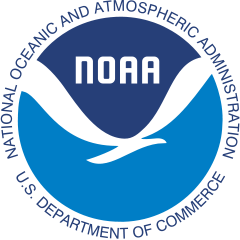Exploring Land-atmosphere interactions and everything in between with Kirsten Findell
 Kirsten Findell has always embraced numbers, expressing an early interest in teaching math to school children. But when the GFDL research physical scientist studied engineering at Princeton University, her occupational desires broadened. At Princeton, she learned how math and science intersect–a revelation that has resonated with her during her years at GFDL.
Kirsten Findell has always embraced numbers, expressing an early interest in teaching math to school children. But when the GFDL research physical scientist studied engineering at Princeton University, her occupational desires broadened. At Princeton, she learned how math and science intersect–a revelation that has resonated with her during her years at GFDL.
Currently a member of the Climate Change, Variability and Prediction Group, Findell spends her work days examining floods and droughts, land-atmosphere interactions, and land cover and land use change.
A graduate of the Massachusetts Institute of Technology (S.M. in 1997 and Ph.D. in 2001) and Princeton University (B.S.E in 1992), Findell’s principle fields of interest include hydroclimatology, land-atmosphere interactions and hydrology. She came to GFDL in 2002.
In the following interview, Findell discusses why understanding the relationship between land surface and land-atmosphere matters and reveals a fancy for fiction.
Why does your research matter?
Human activity, particularly in the last couple of centuries, has and continues to affect the land surface and the atmosphere. Gaining insight into how activities like deforestation or irrigation feed back onto the rest of the climate system and influence local and regional climate can help us better understand the physical world we live in. Improving our understanding of how land-atmosphere interactions impact our biosphere is critical to better understanding our changing climate and its impact on people around the world.
What do you enjoy the most about your work?
The discoveries-the moments of clarity and increased understanding-the opportunity to ask questions about the whole earth system and, bit by bit, develop a more holistic and comprehensive view of our planet.
Where do you do most of your work? In a lab? In field studies?
My work is done almost exclusively on the computer, though I benefit greatly from field and satellite-based measurements taken by countless other climate researchers.
What in your lab could you not live without?
Given that all my experiments are done on large computers, those are the most important part of my lab. We at GFDL are lucky to have a dedicated group of people keeping the computing infrastructure up and running, and always growing to meet our collective needs.
If you could invent any instrument to advance your research and cost were no object, what would it be? Why?
The field of land-atmosphere interactions has been limited by the lack of large-scale observational datasets including soil moisture, precipitation, vegetation properties, radiation, and surface fluxes of heat, moisture and momentum. I would love to have instruments to measure these variables deployed at closely-spaced stations all over the globe. That is a lot of data to ask for from a single station, never mind the large, gridded dataset I would love to have at my disposal!
When did you know you wanted to pursue science?
I had always thought I would be a math teacher until I was introduced to engineering in college and began to discover that math could be a tool to help understand a wide array of physical systems.
What is your personal favorite book?
I read a lot of fiction outside of work, but can?t identify an all-time favorite. A recent favorite was Abraham Verghese’s “Cutting for Stone.” I was attracted to it because of his personal background as a scientist (a medical doctor)-turned-novelist.
Do you have an outside hobby?
I am currently pregnant with our fifth child, so mothering is a big part of my life (though I wouldn’t really call it a hobby). I used to sing and play sports at every opportunity, though those opportunities have been few and far between of late! These days I find myself frequently baking for hungry kids, coaching soccer teams, reading aloud, spending time in our garden, or cleaning up our chicken coop. If I’m lucky, I find a little time to swim or read something just for me!
What would you be doing if you had not become a scientist?
I would probably be a middle school or high school math teacher.


